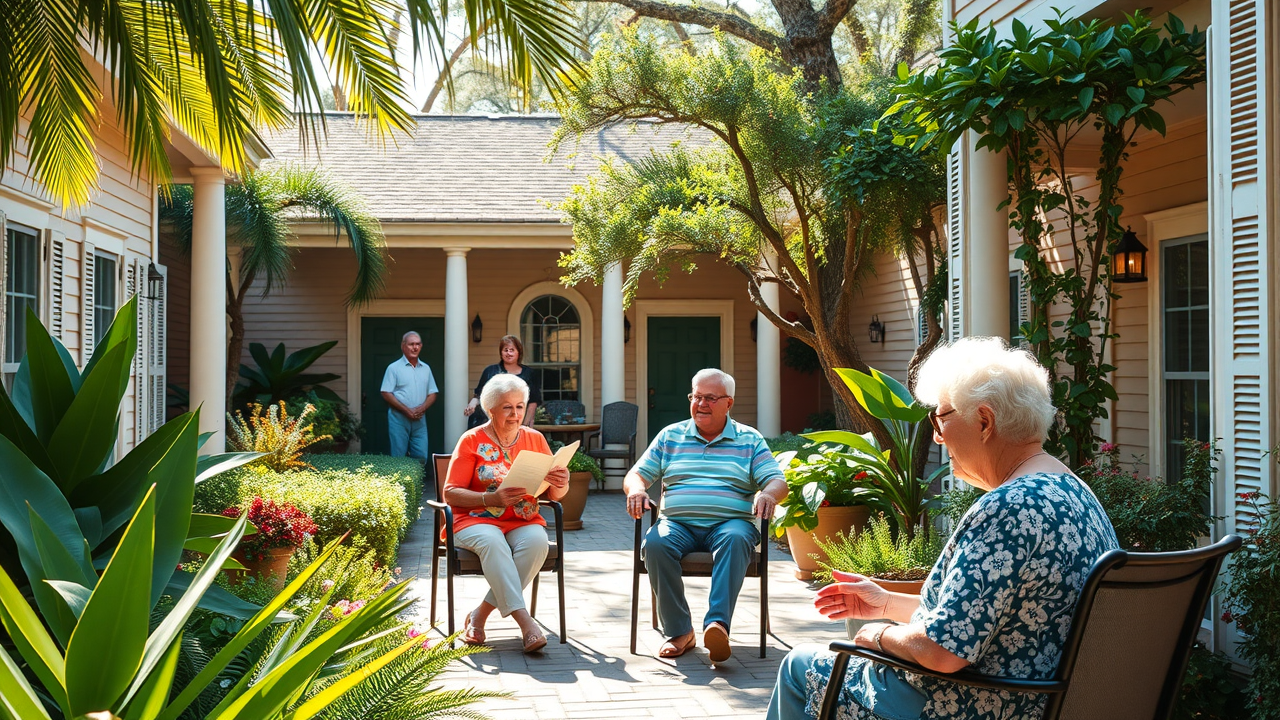-
Did you know that nearly 70% of adults over 65 in Louisiana will need long-term care or support—including options like assisted living and nursing homes—during their lifetime? Choosing between assisted living vs nursing homes Louisiana isn't just a matter of preference; it’s a life-changing decision that can significantly impact quality of life and financial well-being.

Finding the right senior care option in Louisiana can feel overwhelming. The decision between assisted living and nursing homes goes beyond comfort—it's about matching level of care , independence, cost, and cultural fit to your loved one’s unique needs. This guide unpacks the crucial differences, costs, lifestyle factors, and even emotional dynamics to help your family make an informed, confident choice. Ready to discover which option—assisted living or nursing home—is the best fit?
-
Understand key differences and overlapping services between assisted living and nursing homes in Louisiana.
-
Explore amenities, daily life, and levels of care offered by both options.
-
See side-by-side cost breakdowns and payment methods.
-
Find out how to assess needs and legal protections for seniors.
-
Get answers to Louisiana families’ top senior care questions.
Understanding Assisted Living vs Nursing Homes Louisiana: Key Differences and Overlapping Services
-
Assisted living and nursing homes in Louisiana serve older adults needing supportive care, but they are fundamentally different in their approach and services.
-
Assisted living communities are designed for individuals who need some help with personal care and daily living but still want a vibrant, independent environment.
-
Nursing homes , in contrast, focus on more intensive medical care and supervision, supporting older adults with higher physical and health needs.
What is Assisted Living in Louisiana?
-
Assisted living communities in Louisiana are residential facilities that offer personal care services like help with bathing, dressing, meals, and medication management.
-
Residents are typically older adults who are mostly independent but may need support with a few daily activities.
-
These assisted living facilities emphasize social opportunities, independence, and a community lifestyle, including group events, recreation, and communal dining.
Assisted living in Louisiana provides a balance between independent living and necessary support, creating a comfortable setting for seniors who wish to maintain autonomy while receiving assistance with activities of daily living . A typical assisted living community offers private rooms or apartments, communal spaces, and a schedule full of social and recreational events. Staff help with personal care needs, and transportation is often provided for shopping or medical appointments. Most importantly, seniors enjoy a sense of freedom, wellbeing, and community belonging, which distinguishes assisted living from more intensive care options such as nursing home care .
What is a Nursing Home in Louisiana?
-
Nursing homes provide around-the-clock medical care , skilled nursing, and supervision for residents with significant health concerns or disabilities.
-
Residents in nursing homes often require frequent medical treatments, rehabilitation, or support for complex health conditions, such as dementia or mobility challenges.
-
Staffed by registered nurses, licensed practical nurses, and medical professionals, nursing homes are classified as skilled care facilities by the Louisiana Department of Health.

The most notable difference between nursing homes and assisted living lies in the level of medical care available. Nursing homes in Louisiana offer specialized support such as wound care, IV therapy, physical therapy, and ongoing monitoring by healthcare professionals. Residents who require help with nearly every aspect of daily living—or who are unable to live safely with less supervision—find nursing homes the most appropriate senior care option . Nursing homes also abide by strict state and federal regulations to ensure safety, quality, and comprehensive care.
Shared Services: Where Assisted Living and Nursing Home Care Overlap
-
Both settings offer assistance with daily tasks such as bathing, dressing, toileting, and medication management.
-
Meals, housekeeping, laundry, social activities, and transportation are standard services in both assisted living communities and nursing homes.
-
However, the supervision and intensity of support typically differ, with nursing homes providing greater oversight.
“The choice between assisted living and nursing homes in Louisiana is ultimately guided by a combination of medical, personal, and social needs.” — Louisiana Department of Health
Levels of Care: Assisted Living vs Nursing Homes Louisiana Explained
Exploring Levels of Care in Assisted Living and Nursing Homes
-
Low care involves modest help with meal preparation, transportation, and reminders for medications, typically provided in an assisted living setting.
-
Moderate care addresses physical support for daily activities and some medical management.
-
High care is for individuals with significant cognitive or physical impairments requiring skilled nursing and 24-hour monitoring, usually found in Louisiana nursing homes.
Assisted living facilities cater to seniors needing mild to moderate support—think help with dressing, bathing, or medication, but little in the way of complex medical attention. In contrast, nursing homes provide varying levels of care but are best equipped for individuals requiring substantial medical assistance. Emotional support, social activities, and rehabilitation can be found in both, but the balance between independence and oversight shifts as a resident’s needs evolve. Louisiana’s senior care system offers flexibility as older adults move from independent living toward more comprehensive care options.
Choosing the Right Level: From Assisted Living Facility to Nursing Home Care
-
Indicators for moving from assisted living to a nursing home include mounting health problems, increased risk of falls, chronic illness, or daily care needs that surpass what an assisted living facility can provide.
-
A family should consult with healthcare professionals for a functional assessment of medical, physical, and cognitive needs to determine the right environment and level of care .
-
Planning ahead ensures smooth transitions and better outcomes for those facing greater health or supervision needs.
It’s important for families to monitor changes in mobility, memory, or chronic health conditions. When assisted living communities can no longer provide the necessary medical care or supervision, it’s time to consider a nursing home. A gradual approach, including doctor consultations and facility tours, helps residents and their loved ones adapt emotionally and logistically to increased support needs.
Assisted Living Communities vs Nursing Home Facilities: Amenities, Services, & Lifestyle
Daily Life in Assisted Living Louisiana
-
Residents participate in group activities, clubs, or classes, and maintain independence in a lively assisted living community setting.
-
Social connection is a cornerstone—whether through shared meals, fitness classes, art, or excursions and outings.
-
Environmental design in assisted living promotes accessibility, safety, and the freedom to personalize one’s living space.

The daily life in Louisiana assisted living communities centers on wellness, autonomy, and active engagement. Seniors enjoy private rooms or apartments, nutritious chef-prepared meals, and access to on-site amenities like beauty salons, fitness centers, and gardens. These living communities host educational seminars, musical performances, trivia nights, and religious services, fostering an environment where seniors thrive both physically and emotionally.
Life in a Louisiana Nursing Home
-
Nursing homes offer skilled nursing, onsite rehabilitation, wound care, and specialized memory care units for dementia or Alzheimer’s.
-
Medical staff is available 24/7 to manage chronic and acute medical needs, often coordinating with physicians and therapists.
-
Structured schedules, therapy sessions, and specialized equipment support residents’ medical and rehabilitative needs.
Life in a Louisiana nursing home facility is highly structured to ensure safety and fulfillment of medical needs. In addition to regular meals and personal care, residents have access to therapies—like physical, occupational, or speech therapy—designed to support recovery and enhance quality of life. Staff members foster an environment of compassion and dignity, where attention to every medical and emotional detail helps provide a sense of security.
|
Service |
Assisted Living |
Nursing Home |
|---|---|---|
|
Room Type |
Private or shared apartment |
Private or shared room |
|
Supervision |
On-site, not 24/7 nursing |
24/7 medical supervision |
|
Medical Care |
Medication management, health monitoring |
Skilled nursing, complex medical care |
|
Meals |
3 meals daily, dietary options |
Full dining services, therapeutic diets |
|
Social Activities |
Extensive, community-based events |
Therapeutic and recreational programs |
|
Rehabilitation |
Limited ( as needed ) |
Physical, occupational, speech therapy provided |
|
Ideal Resident |
Needs help with some daily tasks, mainly independent |
Requires constant support, higher medical needs |
Costs, Payment Options, and Financial Tips: Assisted Living vs Nursing Homes Louisiana
What’s the Average Cost of Assisted Living in Louisiana?
-
Average monthly rates for assisted living in Louisiana range from $2,900 to $4,100 per month, depending on the facility and services provided.
-
Nursing home care typically costs more, averaging $5,500 to $7,000 per month for a semi-private or private room.
-
Potential hidden fees in both settings include medication management, transportation, and specialty services—always read the contract carefully!

Understanding the true cost of assisted living vs nursing homes Louisiana requires comparing not just monthly rates, but also potential fees for additional care. Some senior living facilities offer a la carte pricing, while nursing homes often bundle medical and custodial care into a higher flat rate. Exploring options early and asking for transparent fee breakdowns protects families from financial surprises and supports better planning.
Paying for Senior Care: Medicaid, Medicare, and Private Pay in Louisiana
-
Medicaid can help cover nursing home care for eligible low-income residents, but coverage for assisted living is more limited and may involve state waiver programs.
-
Medicare does not cover long-term stays in assisted living or nursing homes, but short-term rehabilitation after hospitalization may be covered in a nursing home setting.
-
Many families rely on a combination of personal savings, long-term care insurance , veterans’ benefits, or home equity to finance senior care. Exploring each option with a qualified advisor ensures you maximize every available resource.
|
Cost Factor |
Assisted Living |
Nursing Home |
|---|---|---|
|
Average Monthly Cost |
$2,900 - $4,100 |
$5,500 - $7,000 |
|
Medicaid Coverage |
Limited/waiver-based |
Yes, if eligible |
|
Medicare Coverage |
No (except temporary rehab) |
Short-term rehab only |
|
Private Pay |
Common |
Common |
When to Choose Assisted Living vs Nursing Homes Louisiana: Common Scenarios
Physical Health, Cognitive Concerns, and Family Dynamics
-
A senior who is mobile, sociable, and requires minor help with medications or hygiene is typically best suited for assisted living .
-
When chronic illnesses, limited mobility, memory loss, or complex medication regimens become overwhelming, nursing home care is often necessary.
-
Family disagreements, distance, or lack of home care resources may also influence the decision. Communication among all stakeholders helps ensure the right fit is chosen for the family’s unique situation.

-
Level of Independence: Can your loved one manage daily living mostly alone?
-
Medical Needs: Do they need constant supervision for chronic or acute conditions?
-
Mobility: Are falls or transfers a safety concern?
-
Cognitive Health: Is memory loss progressing or causing concerns?
-
Safety & Supervision: Is wandering or self-harm a risk?
-
Family Support: Do you have resources for in-home care or regular visits?
Legal Rights and Safety: Protecting Loved Ones in Louisiana Senior Care Homes
Resident Protections in Assisted Living and Nursing Home Facilities
-
Louisiana law ensures that residents in both assisted living facilities and nursing homes have legal rights, including dignity, privacy, and participation in care decisions.
-
Facilities must provide clear policies on residents’ rights, safe complaint processes, and information on state oversight agencies.
-
Knowing and advocating for these rights is crucial—family members can also play an active role in monitoring and reporting concerns.
Spotting and Reporting Nursing Home Neglect in Louisiana
-
Warning signs may include sudden physical decline, unexplained injuries, poor hygiene, emotional withdrawal, or delays in medical attention.
-
Louisiana’s Adult Protective Services and the state ombudsman program are immediate resources for concerns about neglect or abuse.
-
If legal intervention is needed, Louisiana lawyers specializing in senior care cases are available to help enforce resident rights and ensure accountability.
Call to Action: Report Nursing Home Neglect - Louisiana Lawyers At stpelaw.com
Expert Insights: What Louisiana Senior Care Professionals Recommend
"Choosing between an assisted living community or a nursing home depends on individual needs and goals—personalized evaluations are essential." — Licensed Louisiana Senior Care Advisor
Watch how Louisiana families navigate emotional and practical decisions when choosing between assisted living and nursing homes. Hear from residents, relatives, and care professionals on making the right move. (Video link or embed coming soon.)
Get expert advice and see real-life examples of the different levels of care, amenities, and financial planning options available in Louisiana’s assisted living and nursing home settings. (Video link or embed coming soon.)
People Also Ask: Assisted Living vs Nursing Homes Louisiana
Is assisted living better than a nursing home?
-
There’s no single answer, as the choice depends on the level of care required, personal preferences, and financial considerations. Assisted living emphasizes independence and socialization; nursing homes provide more intensive medical support and supervision for those with complex needs in Louisiana.
How do you know if you need a nursing home or assisted living?
-
Assess physical health, independence in daily living, medical complexity, and safety risks. If medical needs or supervision exceed what an assisted living community can provide, a nursing home is the safer, more supportive environment.
When should someone go from assisted living to a nursing home?
-
Transition when health and cognitive decline result in recurrent falls, medication mismanagement, or inability to perform daily tasks safely—especially if 24-hour care is needed. Louisiana facilities can help guide and support the process to ensure safety and wellbeing.
What's the average cost of assisted living in Louisiana?
-
Assisted living in Louisiana typically ranges from $2,900 to $4,100 per month , with price variation depending on location, amenities, and resident care needs. Consult financial advisors and facility administrators for specific cost breakdowns and assistance programs.
Frequently Asked Questions about Assisted Living and Nursing Homes Louisiana
-
Do assisted living and nursing homes both offer medical care? Both offer some degree of medical support; nursing homes provide higher-level skilled nursing and complex care.
-
Are visitors allowed in Louisiana assisted living and nursing homes? Yes, within facility guidelines—restrictions may apply during outbreaks or emergencies.
-
Can couples live together in assisted living or a nursing home? Many facilities offer options for couples, but arrangements depend on health and care needs.
-
Are meals and activities included? Yes; all services include daily meals, structured activities, and support for personal care.
-
What is the difference between nursing home care and home care? Nursing homes provide 24/7 skilled care in a facility; home care offers assistance in your own residence, often with less medical oversight.
Key Factors to Remember When Choosing Assisted Living vs Nursing Homes Louisiana
-
Location: Consider proximity to family, hospitals, and community resources.
-
Level of Care: Match the facility’s services to your loved one’s needs today—and tomorrow.
-
Cost: Assess all fees, payment methods, and financial planning tools.
-
Culture & Lifestyle: Tour facilities to gauge fit with resident personality and values.
-
Safety & Legal Rights: Learn about protections, complaint procedures, and advocacy resources in Louisiana.
Final Thoughts: Assisted Living vs Nursing Homes Louisiana—Finding Your Best Fit
-
Every senior and family deserves comfort, affordability, and dignity. Use the information here, tour facilities, talk with professionals—and reach out for legal guidance when needed—to find the best care fit in Louisiana.
-
Report Nursing Home Neglect - Louisiana Lawyers At stpelaw.com
When deciding between assisted living and nursing homes in Louisiana, it’s essential to understand the key differences in care levels, costs, and services offered. Assisted living facilities provide support with daily activities such as bathing, dressing, and medication management, while promoting independence in a community setting. In contrast, nursing homes offer 24-hour medical care and supervision for individuals with significant health concerns or disabilities.
Financial considerations are also crucial. In Louisiana, the average monthly cost for nursing home care is approximately $5,536, which is below the national average of $7,756. Assisted living costs vary but are generally lower than nursing homes, reflecting the different levels of care provided. ( senioradvice.com )
Medicaid coverage differs between the two options. While Medicaid can help cover nursing home care for eligible low-income residents, coverage for assisted living is more limited and may involve state waiver programs. It’s important to explore all available financial assistance options to make an informed decision. ( caring.com )
For a comprehensive understanding of the distinctions between assisted living and nursing homes, including services, costs, and payment options, consider reading “Assisted Living vs. Nursing Homes: What’s the Difference?” by Legacy Estate & Elder Law of Louisiana, LLC. This resource provides valuable insights to help you make the right senior care choice. ( legacycenterla.com )
Additionally, “Assisted Living vs. Nursing Homes: Costs & Payment Options” by PayingForSeniorCare.com offers a detailed comparison of the financial aspects associated with each care option, aiding in your decision-making process. ( payingforseniorcare.com )
If you’re serious about finding the best senior care option in Louisiana, these resources will provide you with the necessary information to make an informed and confident choice.
 Add Row
Add Row  Add
Add 



Write A Comment